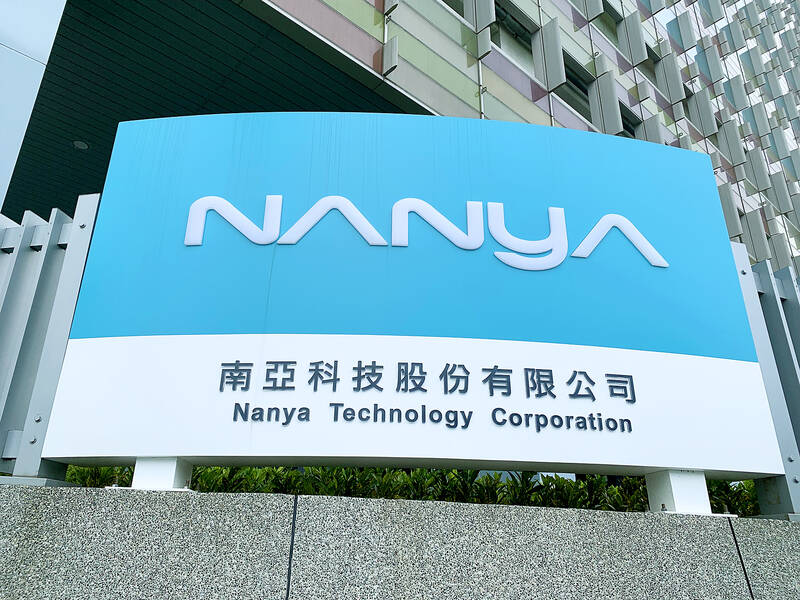DRAM chipmaker Nanya Technology Corp (南亞科技) yesterday said chip prices are expected to bottom out this quarter as supply chain inventory is diminishing at chip customers, paving the way for a gradual revival of DRAM demand in the second half of this year.
The improvement is most evident in the quarterly easing of an inventory glut in the mobile DRAM segment, which is aided by chip production cuts and a mild pickup in mobile phone demand due to China’s economic reopening, the memorychip maker told a media briefing in Taipei.
A recovery in China’s domestic demand and consumption is a key factor behind improved mobile phone sales, Nanya Technology president Lee Pei-ing (李培瑛) said.

Photo: Grace Hung, Taipei Times
However, the recovery would not happen overnight, but should come “step by step,” he said.
“As memorychip suppliers are adjusting capital expenditures and manufacturing capacity to cope with excessive inventory, we are seeing a mild improvement in [inventory] lately and expect significant [progress] in the second half,” Lee said.
In the first half of this year, DRAM demand remained dampened by surging inflation in the US and Europe, as well as Russia’s invasion of Ukraine, Lee said.
The technology dispute between the US and China also affects demand, he said.
For the whole of this year, global DRAM demand is expected to be lower than the average expansion of 10 to 20 percent annually in the past few years, but Nanya Technology is confident about the industry’s long-term growth outlook, Lee said.
To cope with the short-term downturn, Nanya Technology said it would this year slash capital spending by 10.62 percent to NT$18.5 billion (US$606.5 million) from NT$20.7 billion last year.
The the cuts would most severely affect spending on manufacturing equipment, it said.
However, it has no plan to cut jobs, Nanya Technology added.
The statement comes amid a wave of layoffs at US technology companies, including memorychip maker Micron Technology Inc, which this month announced a 10 percent reduction in its global workforce and salary cuts for senior executives.
Nanya Technology would continue to invest in research and development (R&D), as well as technology upgrades, Lee said.
The company’s R&D team comprises 1,000 people and it spent NT$7.8 billion on is efforts last year, or about 14 percent of its total revenue, Nanya Technology said.
The company said that it is making progress in developing next-generation DRAM technology and expects chips made on 10-nanometer nodes to contribute a single-digit percentage to its revenue by the end of this year.
With new technologies coming online, Nanya Technology said it is planning to add new products to its portfolio, such as new-generation DDR5 chips.
Nanya Technology said that the construction of its new Fab 5 would be complete as scheduled in 2025.
The company’s board of directors yesterday approved the distribution of a cash dividend of NT$2.13 per common share. That represents a 45.13 percent payout ratio based on the earnings of NT$4.72 per share last year.

NEW IDENTITY: Known for its software, India has expanded into hardware, with its semiconductor industry growing from US$38bn in 2023 to US$45bn to US$50bn India on Saturday inaugurated its first semiconductor assembly and test facility, a milestone in the government’s push to reduce dependence on foreign chipmakers and stake a claim in a sector dominated by China. Indian Prime Minister Narendra Modi opened US firm Micron Technology Inc’s semiconductor assembly, test and packaging unit in his home state of Gujarat, hailing the “dawn of a new era” for India’s technology ambitions. “When young Indians look back in the future, they will see this decade as the turning point in our tech future,” Modi told the event, which was broadcast on his YouTube channel. The plant would convert

‘SEISMIC SHIFT’: The researcher forecast there would be about 1.1 billion mobile shipments this year, down from 1.26 billion the prior year and erasing years of gains The global smartphone market is expected to contract 12.9 percent this year due to the unprecedented memorychip shortage, marking “a crisis like no other,” researcher International Data Corp (IDC) said. The new forecast, a dramatic revision down from earlier estimates, gives the latest accounting of the ongoing memory crunch that is affecting every corner of the electronics industry. The demand for advanced memory to power artificial intelligence (AI) tasks has drained global supply until well into next year and jeopardizes the business model of many smartphone makers. IDC forecast about 1.1 billion mobile shipments this year, down from 1.26 billion the prior

People stand in a Pokemon store in Tokyo on Thursday. One of the world highest-grossing franchises is celebrated its 30th anniversary yesterday.

Zimbabwe’s ban on raw lithium exports is forcing Chinese miners to rethink their strategy, speeding up plans to process the metal locally instead of shipping it to China’s vast rechargeable battery industry. The country is Africa’s largest lithium producer and has one of the world’s largest reserves, according to the US Geological Survey (USGS). Zimbabwe already banned the export of lithium ore in 2022 and last year announced it would halt exports of lithium concentrates from January next year. However, on Wednesday it imposed the ban with immediate effect, leaving unclear what the lithium mining sector would do in the